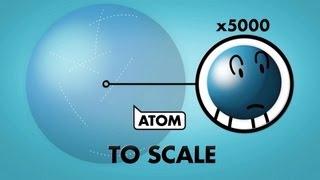(单词翻译:单击)
It is only in the last 100 or so years that human kind has understood that the nucleus of the chemical elements is not always fixed.
近一百年来,人们渐渐明白化学元素的原子核并不总是稳定的。
It can change spontaneously from one element to another.
它可以瞬间变成另一个化学元素。
The name for this process is radioactivity.
这种演变的过程叫放射。
You probably already know something about the nucleus: it's much tinier than the atom,
你可能对原子核已经有一定了解:比如它比原子小,
it's made of particles called protons and neutrons, there are electrons orbiting around it.
再比如原子核是由质子和中子构成的,原子核周围还有电子围绕。
And though the atoms can share or swap electrons when they bond together, the nuclei themselves never change.
虽然原子结合时,他们可以共享或交换电子,但原子核保持不变。
Right? Well, no. Certain nuclei are not stable in that way.
对吗?不对。某些原子核并不稳定。
This means they may change suddenly, spontaneously.
这意味着,他们可能瞬间改变。
The radioactive nucleus flings out a small particle and transforms into another element, just like that.
有放射性的原子核会甩出小物质,并同时变成另外一个化学元素。
For example, the carbon nucleus can eject a fast-moving electron and turn into a nitrogen nucleus.
比如,碳元素的原子核可以甩出一个高速移动的电子,并变成氮元素的原子核。
There are two different particles that can be emitted from radioactive nuclei, but never together.
有放射性的原子核可以甩出两种物质,但不能同时甩出这两种物质。
The very fast electron is known as a beta particle.
移动速度快的电子叫贝塔粒子。
If you know a little bit about electrons, you may be thinking,
如果你对电子有了解,有可能会想,
'What was the electron doing in the nucleus in the first place?'
“为什么原子核里会有电子?”
The answer is there is a neutron in nucleus spontaneously changed into a proton,
答案是因为核中的中子,自发瞬间变成质子,
which stayed behind, and the electron flew out as a beta particle.
质子留在原子核内,但一个电子以贝塔粒子形式弹射出来。
This is not what chemistry has taught us to expect. The nucleus is supposed to be stable.
这不是传统化学所教的。原子核应该是稳定的。
Neutrons don't change into protons. Except, sometimes they do!
中子不会自发变成质子。但是,有时候他们却会!

The other particle it emits spontaneously from an unstable nucleus is alpha.
另一个从不稳定的原子核自发射出的粒子叫阿尔法粒子。
An alpha particle is 8,000 times more massive than beta, and it's a bit slower.
阿尔法粒子是贝塔粒子质量的8000倍,而速度要慢些。
Alpha is made from two protons and two neutrons.
阿尔法粒子是由两个质子和两个中子构成的。
If we trap all those alpha particles together, we get helium gas. Alpha is a helium nucleus.
如果我们把弹射出的阿尔法粒子搜集起来,我们将获得氦气。阿尔法粒子是氦气的原子核。
Like the beta particle, you would not have expected a heavier nucleus to throw out helium.
很难想象原子核会弹射出贝塔粒子,更不要说重很多的氦气了。
But again, it happens, and the nucleus becomes a new element.
但事实再一次超出我们想象,弹射出的原子核变成一个新的元素。
So, is radioactivity useful or just dangerous?
那放射是有益还是有危害呢?
Wherever you are sitting, it is quite likely that there is a device nearby
其实无论你坐在哪里,周围都很有可能
which contains a source of alpha particles: a smoke detector.
有一件有阿尔法粒子的电器:比如烟雾探测器。
The source is radioactive Americium.
里面就有带放射性的镅元素。
You are totally safe from these alpha particles, which cannot travel more than a few centimeters in air.
这些阿尔法粒子对你完全无害,因为它们只能在空气中传播几厘米。
Beta particles penetrate much farther through materials than alpha can.
较阿尔法粒子而言,贝塔粒子穿透力强很多。
Radioactive atoms are used in medicine as traces, to show where chemicals travel in the patient.
放射性元素在医学上被用做示踪剂,来显示药物到达了人体的哪个部位。
Beta particles are emitted and have enough energy to emerge from the body and be detected.
被释放的贝塔粒子有足够的能量穿透人体并被监测到。
There is a third type of nuclear radiation: gamma, which is not a particle at all.
除了阿尔法和贝塔粒子外,还有第三种辐射:其实不是粒子的伽马。
It is an electromagnetic wave, like microwaves, or light, but it is actually 1,000 times more energentic than visible light.
它是一种电磁波,像微波或是光,但它是可见光能量的1000倍。
Gamma rays may pass right through your body.
伽马射线可以轻松穿透你的身体。
Gamma is used to zap the bacteria in fruit to increase its shelf life, or in radiotherapy to kill cancer cells.
伽马射线被用于农副产品的消毒,从而增加保质期,或被用于放射疗法来杀死癌细胞。
Radioactive substances get hot, and this heat can be used to generate power.
放射性元素会发热,而热能可以用于发电。
This heat has been brought to you since space probes, and, in the past, in pacemakers for hearts.
这种热能被用在空间探测仪上,而过去则被用在心率起搏器上。
The more abruptly nuclear radiation is slowed down, the more damage it does to the atoms it hits.
核辐射减速越快,对被击中的原子伤害就越大。
This is called ionization. Alpha causes the most ionization as it crashes into other atoms and gamma the least.
这被称之为电离。阿尔法粒子撞击其他原子时造成的电离最大,而伽马造成的电离最小。
In humans, the most serious effect of radiation is the damage that it can cause to our DNA.
对人类而言,放射对人体最大的危害在于其对DNA的伤害。
Although alpha cannot penetrate your skin,
尽管阿尔法粒子不能穿透皮肤,
if you inhale or injest a radioactive nucleus, the health consequences can be severe.
但如果你误吸食了放射性原子核,那么对健康的影响会严重。
Radioactivity is both useful and deadly, but it is all around us as a background to the natural world.
放射既有用又有危险,但它就在我们身边,像自然世界的背景一样。


